Pekin ducks are white in colour and a large breed that was domesticated over 2000 years ago. Although the location is often disputed, all agree it was probably somewhere in Southeast Asia. The Pekin duck was standardised in the UK in 1901. The Pekin duck in its purest form has recently been added to the Rare Breeds Survival Trust ‘watchlist’.
Amongst other pure and rare breed ducks, all our branch farms keep Pekins, so you’ll often find Pekin eggs in your duckling hatching kits.
We’ve put together a few of our favourite Pekin duck photographs taken over the years, which show the stages of development from newly hatched ducklings to fully grown ducks. We hope you enjoy!
Many of our customers decide they want to keep the ducklings they have hatched, so we’ve included a Q and A section and some links after the photos.
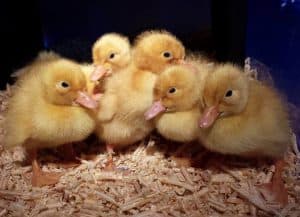
Newly hatched ducklings, East branch farm. You can still see the ‘egg tooth’ – a sharp point at the end of their bills which helped them to peck their way out of the egg.
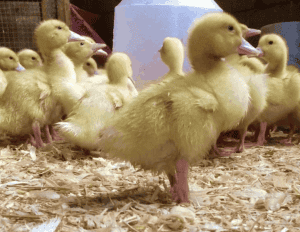
Ducklings at 10 days old, East branch farm. This is the age they return to us from schools, nurseries and care homes who have chosen to sign over ownership at the end of the hire period.
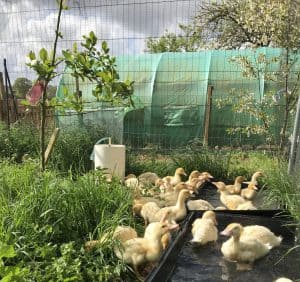
Ducklings at 3 weeks old, East branch farm. Ducklings are hardier than chicks, so can go outside for short periods of time in good weather if they are appropriately protected from predators.
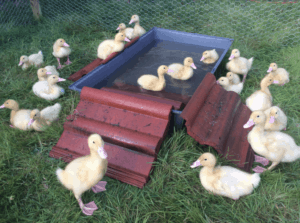
Ducklings at 4/5 weeks old, London/South East branch farm. You can see their yellow colour is just starting to fade to white.
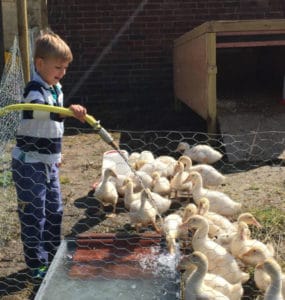
Ducklings getting ready for bath time at 6 weeks old, London/South East branch farm.
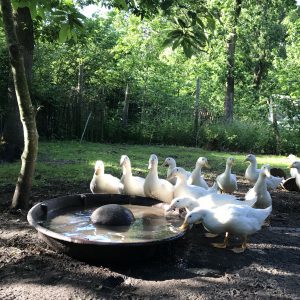
Ducklings at 7/8 weeks old, East branch farm. The birds are still very fluffy, but now completely white.
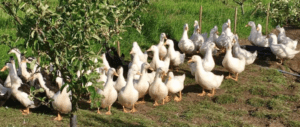
Ducklings in the orchard at 10 weeks old, Scotland/North/Midlands branch farm. Their mature feathers have started to grow.
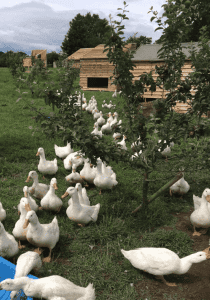
Ducklings at 15 weeks old, Scotland/North/Midlands branch farm. Now they are looking a lot more mature, although they still have some growing to do.
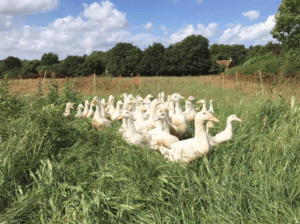
Mature ducks enjoying the sunshine, London/South East branch farm.

Mature ducks, South West branch farm.
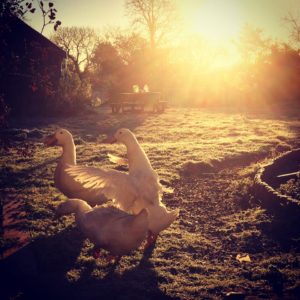
Mature ducks on a frosty winter morning, East branch farm.
Questions and Answers
Q. Why is this such a popular breed of domestic duck?
A. The Pekin is popular because it is a great ‘all rounder’, whether kept as a pet, for eggs or meat. They are quite calm and friendly in temperament.
Q. What colour are they when they hatch?
A. Yellow!
Q. What do they need when they are babies?
A. They need non-medicated chick crumb, water and heat (a hot plate or heat lamp) – as well as a nice, dry surface to bed down on and room to exercise. They also need protecting from predators, as they are very vulnerable until they reach about 6/7 weeks of age. Rats, crows, foxes, birds of prey and even some cats will all take ducklings if they have the chance. A covered run and a heat source is a must if they are spending unsupervised time outside.
Q. What kind of environment do they need as adults?
A. Ducks need access to clean water, ideally enough to be able to submerge their whole bodies. As well as keeping them very happy, this keeps their oil glands running free, feathers in good condition and helps prevent eye infections. A rigid paddling pool which can be easily upturned and refilled by a hosepipe is ideal for a few pet ducks. Ducks enjoy a mixed diet. The main part of their diet should consist of a commercial feed, suitable for ducks and geese. Peas, leafy greens, corn, non-citrus fruit and worms are all suitable supplements. Pekin ducks need to be shut away from predators at night – domestic ducks do not have the same defences as wild ducks. Access to plenty of fenced in outdoor space to exercise is also needed – grass is preferable.
Q. Are Pekin ducks messier to keep than chickens?
A. Yes! These are large birds when mature, so naturally make more mess. Factor in their need for water, and without enough space and good management, you have the perfect recipe for a mud bath.
Q. Can Pekin ducks fly?
A. No, Pekin ducks are flightless, which makes them quite easy to contain.
Q. How can you tell males from females?
A. It is very hard to accurately sex ducklings. It is much easier to wait until they are between 6-8 weeks old. The easiest way to tell is by the sound they make. A male makes a fairly quiet, almost whispered quack, whereas you will be able to hear the loud quack of a female from the bottom of your garden! Mature males also have a curl at the end of their tails, called a drake feather.
Q. What happens if you have too many males in a flock?
A. A flock with more males than females is unlikely to be a happy one. The males will compete with each other and harass the females. Our advice to customers wishing to keep their ducks is to either keep 2 or keep 4 or more and be prepared to split the flock. If 2 are kept the ducks will be happy, regardless of which sex they are. If 4 or more are kept, the flock can be split if there are too many males. Male only flocks will be perfectly happy living together – it is only when a female is present that the trouble starts! Female only flocks will also be happy, as will mixed sex flocks where the males do not outnumber the females. Ducks should not be kept singularly – they like company of their own kind and will be very unhappy living alone.
Q. Can you eat their eggs?
A. Yes! Duck eggs are delicious and many cooks claim that using them instead of chickens eggs produces the best cakes! A female Pekin will lay around 200 eggs a year.
Q. How long to Pekin ducks live for?
A. 9-12 years.
Q. Do they make good pets?
A. Yes they do – if you have enough space. They are easy to tame and very friendly.
Q. What happens to the ducklings if we choose to sign over ownership to Incredible Eggs?
A. Each branch farm of Incredible Eggs provides a local service by supplying domestic poultry keepers and smallholders with quality birds. You can find out more by visiting our FAQ page.
Further reading:
Everything you need to know about Pekin ducks – PetHelpful
